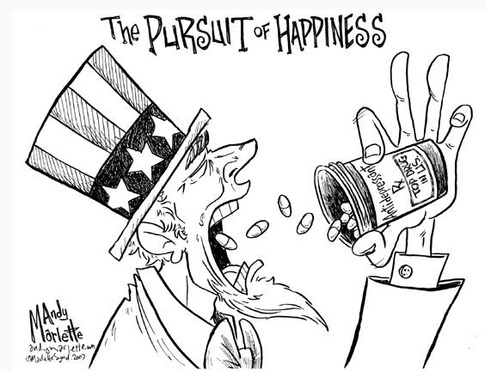Are Antidepressants Being
Misused?
Depression is a serious problem that is affecting
lots of people all over the world. From the treatments available, antidepressants
first became a common solution after the US Food and Drug Administration (FDA) approved
fluoxetine in 1987. Since then, antidepressants are amongst the most prescribed
medications in the world (Johnson & Kirsch,
2008, p. 54) .
This may be strictly related to the increase in depression and other related
illnesses in people in the past decades, but it can also be influenced by the
insurance and medical companies which are generally more leaned to opt for a
relatively inexpensive pharmacotherapy, rather than more expensive and time
consuming psychotherapies (Casey, 2013) . Antidepressants are
being misused, even when their actual benefits are doubtful compared to all the
side effects they seem to have.
 Depression is the response to a bad event or a
series of bad events that produce a long-term more profound burden. There are
several ways to treat depression that do not have to be taking pills; ranging
from just exercising, to omega-3 fatty acids supplements, to psychotherapy. Antidepressants
have quick and short term benefits for those who use them right, but they seem
to have major benefits in people with more severe cases of depression. As Thomas
Insel explains on his article in the NIH that, “In some patients, perhaps
those with more severe clinical conditions, they appear to be essential for
remission.” Dr. Casey also explains in his article that, “A much discussed
meta-analysis performed by Kirsch et al. (…) showed limited efficacy for
antidepressants, especially in milder cases of depression”
Depression is the response to a bad event or a
series of bad events that produce a long-term more profound burden. There are
several ways to treat depression that do not have to be taking pills; ranging
from just exercising, to omega-3 fatty acids supplements, to psychotherapy. Antidepressants
have quick and short term benefits for those who use them right, but they seem
to have major benefits in people with more severe cases of depression. As Thomas
Insel explains on his article in the NIH that, “In some patients, perhaps
those with more severe clinical conditions, they appear to be essential for
remission.” Dr. Casey also explains in his article that, “A much discussed
meta-analysis performed by Kirsch et al. (…) showed limited efficacy for
antidepressants, especially in milder cases of depression”
Most of the studies conducted on antidepressants
were made on short term benefits; as Dr. Casey explains in his article, “A
large number of placebo-controlled trials of various antidepressants have been
published, most showing efficacy compared with placebo. Many of these studies
are relatively small and short-term in nature” (2013, p. 162) . Considering the
large list of side effects of antidepressants and the lack of research on long-term
effects, it would seem logical for people with milder cases of depression to
pursue one of the other treatments mentioned above. Nevertheless, their quick
efficacy and large recommendation from most physicians makes them the fastest
and most appealing option in the market. They are being largely used by people
in the US, not minding if they have or not severe symptoms of depression. Insel
explains that, “Although depression and anxiety disorders are the primary
indications for prescribing antidepressants, doctors have prescribed these
medications, generally “off-label,” to treat chronic pain, menstrual symptoms,
low energy, and other maladies, with or without accompanying depressive or
anxiety symptoms.” This should be a wake up call for people to not let themselves
be fooled by the marketing system.
References
Casey, D. A. (2013). Do
Antidepressant Medications Work? P&T , 38 (3).
Insel, T. (2011, December 6). National Institute of
Mental Health. Retrieved from
http://www.nimh.nih.gov/about/director/2011/antidepressants-a-complicated-picture.shtml
Johnson, B., & Kirsch, I. (2008, June). Do
antidepressants work? statistical significance versus clinical benefits. Significance
, 54-58.
What are the real risks of antidepressants? (2005).
Retrieved from Harvard Health Publications:
http://www.health.harvard.edu/mind-and-mood/what_are_the_real_risks_of_antidepressants


No comments:
Post a Comment